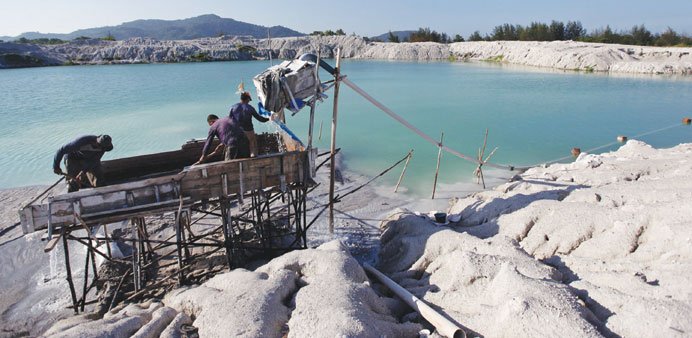Miners labour on a platform as they sluice for tin ore at a mine in Sungai Liat, Indonesia. The country’s mining ministry yesterday sought to ease a controversial mineral export ban before its Sunday deadline.
Reuters/Jakarta
Indonesia’s mining ministry sought to ease a controversial mineral export ban before its Sunday deadline, but still looked set to prohibit more than $2bn worth of annual nickel and bauxite shipments.
Indonesian government officials are scrambling to pass regulations to ease a ban on unprocessed mineral ore exports from January 12. The ban aims to boost Indonesia’s long-term return from its mineral wealth, but officials fear a short-term cut in foreign revenue that could widen the current account deficit at a time when the economy is slowing.
“The (mining) ministry proposed that miners will be given flexibility to export concentrate or processed minerals until 2017,” Sukhyar, director general of coal and minerals, told reporters.
“After 2017, they will only be allowed to export metal or refined mineral,” he said. The mineral ban is one of Indonesian President Susilo Bambang Yudhoyono’s biggest economic policy moves in his nearly 10 years in office.
Under the proposed regulations, miners such as US giants Freeport-McMoRan Copper & Gold and Newmont Mining Corp would still be allowed to export copper, manganese, lead, zinc, and iron ore concentrate until 2017.
Freeport and Newmont, however, would not be allowed to ship copper concentrate after 2017. The two companies account for 97% of the country’s copper production and currently refine only about a third of their copper output in Indonesia.
“The point here is ... around three years from now, they must purify,” Sukhyar said.
The ministry decided to keep the ban on nickel ore and bauxite because of ample domestic smelters, he added. Indonesia is the world’s top exporter of nickel ore.
Out of the hundreds of nickel miners in Indonesia, only PT Antam and PT Vale Indonesia currently process their ore domestically. Last month, the mining ministry forecast nickel production would tumble 78% this year compared to 2012, while bauxite would plummet 97%.
Analysts expect global nickel prices to rise if Indonesia follows through on its ban.
“If there is a ban, we think there is considerable upside,” said Citi commodities strategist Ivan Szapakowski, who forecast that the LME’s benchmark 3-month nickel contract could rise as high as $17,000 a tonne from $13,502 currently. Shares in Indonesian mining firms rose on the Jakarta stock exchange yesterday, with the mining index up 1.8%.
The proposal could still be tweaked and must be approved by the president, who is expected to support the changes. Yudhoyono’s administration has backed policies aimed at generating greater profits and creating more jobs from the country’s vast natural resources, with some success in tin, cocoa and palm oil.
Under the new rules, mining companies must process their ore before shipping it overseas, a measure initially passed in 2009 to boost the value of exports from Indonesia, the world’s top exporter of nickel ore, thermal coal and refined tin. But companies have hesitated to invest the hundreds of millions of dollars necessary to build smelters due to ample global refining capacity, low commodity prices, and Indonesia’s history of backing away from controversial policies.

